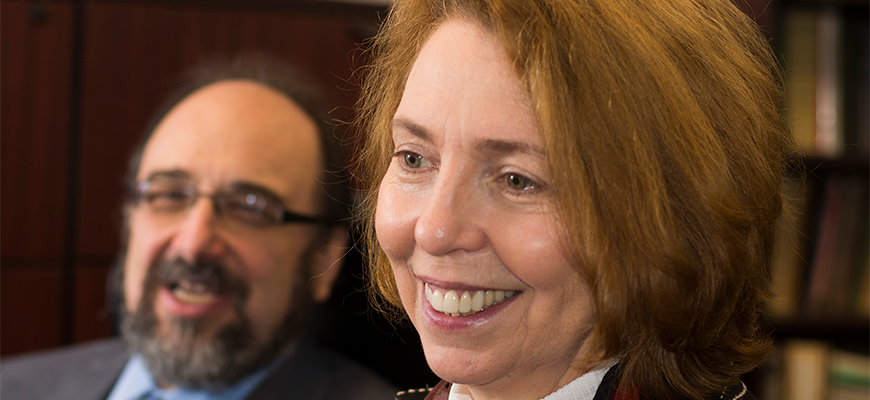
Pharmacy researcher driven to find weapons in the fight against cancer
Posted on: October 12, 2022; Updated on: October 12, 2022
By Margaret Gregory, mar24@mailbox.sc.edu
As a young girl growing up in Kyiv, Ukraine, Eugenia Broude always knew she would someday be a scientist. The daughter of an engineer (her mother) and a physicist (her father), Broude was constantly surrounded by science.
But the specialized school in Kyiv that offered advanced curriculum in biology, chemistry and math was not in the district where Broude lived and she normally would not be allowed to enroll.
But that did not deter Broude. Armed with her stellar report card, the admittedly shy 12-year-old Broude bravely endured three bus rides and an hour-long walk to the school she wanted to attend. Upon arriving, she asked to speak to the school’s director to plead her case. It worked.
Broude’s education eventually led her to earn a Ph.D. in biochemistry/molecular biology from the Ukrainian Academy of Sciences. Following her doctoral studies, she came to the United States and completed a postdoctoral fellowship in molecular biology and neuroscience at the National Institute of Child Health and Human Development.
Broude joined the University of South Carolina 11 years ago as a member of the SmartState Translational Cancer Therapeutics Center led by Igor Roninson, Ph.D. She now is an associate professor in the Department of Drug Discovery and Biomedical Sciences in the College of Pharmacy.
Deeply personal reasons inspired her to focus her research on cancer treatment.
“My father passed away from cancer during my first year of university,” she says. “And a very dear friend battled 19 years against breast cancer, advanced breast cancer, metastatic breast cancer and finally ovarian cancer. Even when I am tired and frustrated, thinking of her makes me ready to fight it again.”
Her most recent research centers around the resistance of certain types of breast cancer to drug treatments.
Our COBRE Center for Targeted Therapeutics is also a unique asset for professional development, which not only supports research and instrumentation cores, but also allowed an entire generation of researchers to start their careers, and without new researchers, science will not advance.”
Cancer treatment has made tremendous strides in recent decades with the advent of novel drugs that are designed to block individual proteins that are critical for specific, well-defined types of cancer. Possibly the best-known and the most widely used among such tailored drugs are those that target HER2, a protein found in about one-quarter of all breast cancers and required for the growth of these cancers.
Training students is on the same level of importance as what we do in the lab ... without new researchers, science will not advance.
Eugenia Broude, College of Pharmacy
HER2-targeting drugs showed great benefit for early stage patients with HER2-positive breast cancer; however, when these drugs are used to treat patients whose cancer has already spread through the body, the benefit of HER2-targeting drugs is often just temporary. Tumors eventually become resistant and continue to grow despite drug treatment.
The problem of drug resistance occurs with nearly all the anticancer drugs, and it represents the biggest overall challenge to curing cancer patients. A new study conducted by Broude’s team, including graduate student Xiaokai Ding, postdoctoral fellow Amanda Sharko and several others, in collaboration with Roninson and John Crown, Ph.D., University College, Dublin, Ireland, was recently published in Proceedings of the National Academy of Sciences and suggests a novel approach to bypassing tumor resistance to HER2-targeting drugs.
The new approach involves using drugs that inhibit Mediator kinase, a protein that tumor cells use to change their biological programs in a way that allows them to adapt to adversarial conditions, such as drug treatment. When HER2-targeting drugs were combined with Mediator kinase inhibitors (discovered by Senex Biotechnology, a South Carolina company), their efficacy against HER2-positive breast cancers was greatly increased even when the tumors were already resistant to HER2-targeting drugs used alone, and, moreover, resistance to these drugs did not develop in the sensitive tumor cells. These findings suggest that combining Mediator kinase inhibitors with HER2-targeting drugs and potentially with other anticancer agents can prevent and overcome the key challenge of drug resistance in cancer.
The discovery itself was rather serendipitous — the result of an oversight in the lab.
“Someone forgot to throw out some flasks with tumor cells that seemed to have all died after drug treatment, but the tumor cells came back in the flasks that were kept too long — except for those flasks where a Mediator kinase inhibitor was added to the drug,” she says.
A newly awarded $3 million R01 grant from the National Cancer Institute will allow Broude and her co-investigators, Roninson and Hexin Chen, Ph.D., biology, to continue their work in this groundbreaking area of breast cancer research. In addition, Broude and Mengqian Chen, Ph.D., pharmacy, recently were awarded an NIH/NCI Small Business Innovation Research grant for breast cancer treatment studies. In collaboration with a colleague at the University of Alabama, she also has applied for two additional grants that will focus on ovarian cancer research.
For all her career focus on research, Broude also understands the significance of training young researchers who will come after her. Her lab always welcomes undergraduate and Pharm D students eager to take part in research.
“Training students is on the same level of importance as what we do in the lab,” she says. “Our COBRE Center for Targeted Therapeutics is also a unique asset for professional development, which not only supports research and instrumentation cores, but also allowed an entire generation of researchers to start their careers, and without new researchers, science will not advance.”